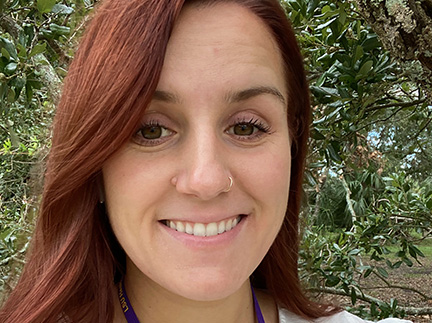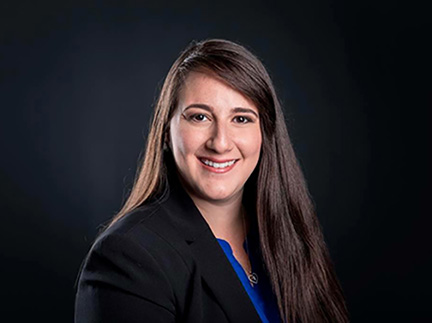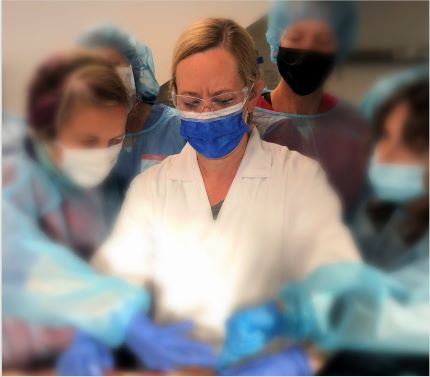Learn new skills in scholarship and teaching or enhance your knowledge of simulation education through graduate certificates offered through EVMS Medical and Health Professions Education.
Graduate Certificates
Learn more about the program.
Meet with a program representative.
Thank you
Program Benefits
On-ramp to a graduate degree
Transfer nine to twelve certificate course credits to the MHPE Master's or Doctoral degree
Added Credential
Certificates may count towards continuing education requirements
Fully online
Complete all coursework asynchronously in one year
The MHPE Scholarship Certificate prepares medical and health professionals with new skills to build competence in educational scholarship. It enables learners with skills in designing educational scholarship projects including research and program evaluation, critiquing published literature for work-place application and decision-making, and presenting data in a meaningful way for stakeholders.
This certificate is for anyone interested in enhancing their educational scholarship skills. Whether you currently:
- Are conducting or plan to conduct qualitative, quantitative or mixed methods educational studies
- Are seeking ways to broaden your approach to educational scholarship
- Wish to better support those who are conducting educational scholarship
Course Requirements
| Course # | Name | Semester | Credit hours |
|---|---|---|---|
| MHPE 715 | Educational Scholarship Methods | Fall | 3 Credits |
| MHPE 606 | Mixed Methods Research Designs | Spring | 3 Credits |
| MHPE 705 | Applied Statistics | Summer | 3 Credits |
| MHPE 702 | Program Evaluation | Fall (optional) |
3 Credits |
| Total | 9-12 Credits |
Course Descriptions
Educational Scholarship Methods
This course provides the knowledge necessary to understand the purposes and processes of research using an expanded definition of scholarship that goes beyond the scholarship of discovery (research) to include the scholarship of integration, the scholarship of application, and the scholarship of teaching. The course will also introduce students to quantitative and qualitative design approaches, examine foundational issues of research from both quantitative and qualitative perspectives, and build skills for interpreting and evaluating research including criteria for evaluating empirical studies, particularly in the social sciences and in education.
This introductory course in program evaluation takes the learner from the beginnings of program evaluation as an academic discipline through current logic model-based evaluation that encompasses the ethical, political and social landscapes within which an evaluation resides. Students will have an opportunity to design each step of an educational program evaluation beginning with an evaluability assessment. Diverse models focused on different stakeholder audiences and program goals will be implemented to evaluate real-life, ongoing educational programs selected by each student. Students will develop logic models to guide evaluation planning and implementation. Data collection and analysis plans will include quantitative, qualitative and mixed methods approaches. The course will culminate in presentation of an evaluation report based on data from actual educational programs.
Learners will gain an understanding of the statistical tests used in medical and health professions education research. The focus is on understanding why a particular test is used and how to interpret and apply results obtained from each test. Utilizing SPSS statistical analysis software, learners will perform all statistical procedures related to descriptive statistics and inferential statistics such as t-tests, analysis of variance, correlation, regression, and chi-square. Visual representation of data will also be covered.
Mixed Methods Research Designs
Learners will explore general qualitative/quantitative research methods used in medical and health professions education research. The goal of the course is acquisition of skills needed to understand, plan, manage, analyze, and interpret studies where data is mixed (qualitative and quantitative).
The MHPE Business of Simulation Certificate is jointly administered by the School of Health Professions and the Sentara Center for Simulation and Immersive Learning (SCSIL). We designed this certificate for healthcare professionals who are interested understanding in learning the core business principles needed to manage a simulation center.
Course Requirements
| Course # | Name | Semester | Credit hours |
|---|---|---|---|
| MHPE 725 | Business of Simulation | Fall | 3 Credits |
| Total | 3 Credits |
Course Description
Today’s simulation centers are analogous to small businesses, in that they involve small teams leveraging limited resources to support the mission critical needs of clients (students, faculty, residents, practicing clinicians, etc.). Like small businesses, it is critical for simulation leaders to understand and manage both immediate and long term resource requirements and planning considerations be they funding, staff, equipment, or space related. This certificate explores the core business principles required to help leaders both better manage their center and develop or hone their business model for both internal and external opportunities.
The MHPE Teaching Certificate provides advanced skills in developing appropriate instruction, curriculum and assessment strategies for academic and clinical settings with an emphasis on real-world, practical applications. This certificate program is designed for those who:
- Wish to become more of an educational leader at their institution
- Teach or plan to teach students, residents or other medical and health professionals
- Play a role in curriculum development, revision or evaluation
Course Requirements
| Course # | Name | Semester | Credit hours |
|---|---|---|---|
| MHPE 608 | Sociocultural Contexts of Teaching and Learning | Fall | 3 Credits |
| MHPE 609 | Designing Educational Experiences | Spring | 3 Credits |
| MHPE 610 | Practicum (Virtual) | Summer | 3 Credits |
| Total Credits | 9 |
Course Descriptions
Sociocultural Contexts of Teaching and Learning
The goal of the course is to provide learners with a strong background for designing educational experiences, planning educational programs, and conducting research on a variety of teaching and learning-related questions. Application of principles to medical and health professions education is expected. The course is designed to help participants consider the meaning of learning and the various contextual factors that influence the learning process in higher education. This course explores the application of the learning science in the design of learning environments. Learners evaluate inclusive, diverse, and equitable educational environments and use insights to improve practices, as well as the technologies higher education institutions use to document and assess learning.
Designing Educational Experiences
This course prepares learners with theoretic foundations and best practices to plan, apply, design, and evaluate appropriate instructional methods to enhance learner achievement. Application of principles to medical and health professions education is expected. Learners will analyze a wide range of instructional methods and then design an array of formative and summative assessments utilizing evidence-based assessment instruments and techniques.
The practicum provides learners with an in-depth supervised opportunity to apply knowledge and skills gained in the two MHPE core teaching courses – Sociocultural Contexts of Teaching and Learning and Designing Educational Experiences. Working as part of a simulated faculty team, learners will completely develop all components of an online course. This is a virtual practicum.




